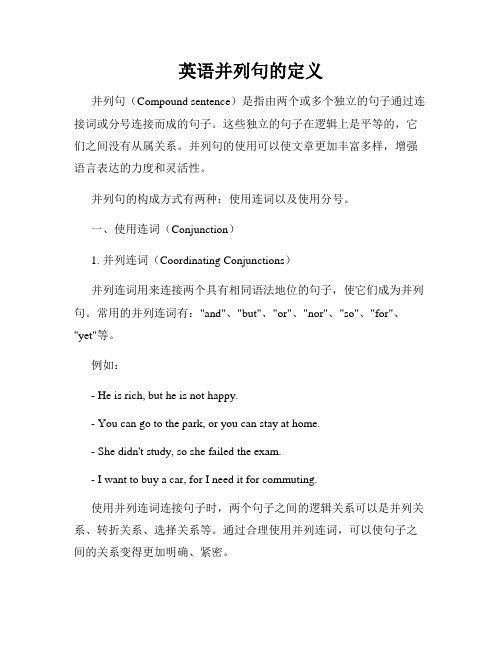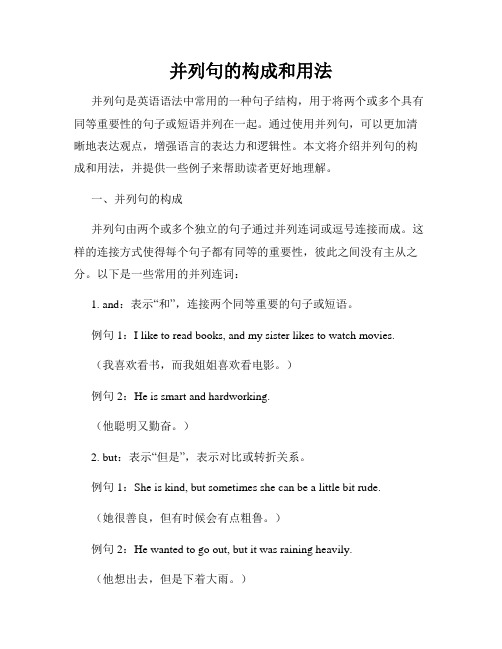并列句
英语并列句的定义

英语并列句的定义并列句(Compound sentence)是指由两个或多个独立的句子通过连接词或分号连接而成的句子。
这些独立的句子在逻辑上是平等的,它们之间没有从属关系。
并列句的使用可以使文章更加丰富多样,增强语言表达的力度和灵活性。
并列句的构成方式有两种:使用连词以及使用分号。
一、使用连词(Conjunction)1. 并列连词(Coordinating Conjunctions)并列连词用来连接两个具有相同语法地位的句子,使它们成为并列句。
常用的并列连词有:"and"、"but"、"or"、"nor"、"so"、"for"、"yet"等。
例如:- He is rich, but he is not happy.- You can go to the park, or you can stay at home.- She didn't study, so she failed the exam.- I want to buy a car, for I need it for commuting.使用并列连词连接句子时,两个句子之间的逻辑关系可以是并列关系、转折关系、选择关系等。
通过合理使用并列连词,可以使句子之间的关系变得更加明确、紧密。
2. 连接副词(Correlative Adverbs)连接副词是一种特殊类型的连接词,它常常用来连接两个句子,形成并列句。
常用的连接副词有:"both...and"、"either...or"、"neither...nor"、"not only...but also"等。
例如:- Both Tom and Mary are going to the party.- You can either stay at home or go shopping.- Neither John nor Sarah is available today.- Not only does he play the guitar, but he also sings beautifully.连接副词的使用可以在表达中强调两个句子之间的相似性、选择性或者转折性。
并列句

John demands the most from himself; Peter from others。
并列句(2)句型
:简单句+并列连词+简单句常见的并列 连词有also, and, but, either ... or, however, not only...but also, or, or else, so, still, yet, neither...nor.并列句是由两个或两个以上 的简单句连接而成。并列句中的各简单 句意义同等重要,相互之间没有从属关 系,是平行并列的关系。它们之间用连 词连结。
五、其他并列连词
1. not... but... (不是......而是) It was not the bones of an animal but of a human being. 这 不是一只动物的骨头,而是人的骨头。 2. rather than(而不是;与其......宁愿) Rather than ride on a crowded bus, he always prefers to ride a bicycle. 3. when(正当那时, 相当于and at that time) Mary was holidaying with her family in a wildlife park when she was bitten on the leg by a lion.
鱼越多,船越少;船越多,鱼越少。 承诺越多,实现越少;实现越少,服务越差。
well-known quotation--___ is power.
并列句的构成和用法

并列句的构成和用法并列句是英语语法中常用的一种句子结构,用于将两个或多个具有同等重要性的句子或短语并列在一起。
通过使用并列句,可以更加清晰地表达观点,增强语言的表达力和逻辑性。
本文将介绍并列句的构成和用法,并提供一些例子来帮助读者更好地理解。
一、并列句的构成并列句由两个或多个独立的句子通过并列连词或逗号连接而成。
这样的连接方式使得每个句子都有同等的重要性,彼此之间没有主从之分。
以下是一些常用的并列连词:1. and:表示“和”,连接两个同等重要的句子或短语。
例句1:I like to read books, and my sister likes to watch movies.(我喜欢看书,而我姐姐喜欢看电影。
)例句2:He is smart and hardworking.(他聪明又勤奋。
)2. but:表示“但是”,表示对比或转折关系。
例句1:She is kind, but sometimes she can be a little bit rude.(她很善良,但有时候会有点粗鲁。
)例句2:He wanted to go out, but it was raining heavily.(他想出去,但是下着大雨。
)3. or:表示“或者”,表示选项之间的关系。
例句1:Do you want tea or coffee?(你想要茶还是咖啡?)例句2:You can choose to either walk or take the bus.(你可以选择步行或者坐公交车。
)4. so:表示“所以”,表示因果关系。
例句1:It was raining, so we stayed at home.(下雨了,所以我们呆在了家里。
)例句2:He studied hard, so he passed the exam.(他努力学习,所以考试通过了。
)二、并列句的用法并列句的使用可以使句子更加丰富多样,增加语言的表达力和逻辑性。
英语并列句例句30个

英语并列句例句30个1. I wanted to go for a walk, but it started to rain.我想去散步,但开始下雨了。
2. She enjoys reading novels, and she also loves writing poetry.她喜欢读小说,也喜欢写诗。
3. He studied hard for the exam, so he passed with flying colors.他为考试努力学习,因此他顺利通过了。
4. You can either stay here, or you can come with us.你可以留在这里,或者跟我们一起去。
5. The sun was shining, yet the air was still quite chilly.太阳在照耀,但空气仍然很冷。
6. I need to buy groceries, and I also have to pick up the dry cleaning.我需要买杂货,也要去拿干洗的衣服。
7. He plays the guitar, but he also sings beautifully.他弹吉他,但他唱得也很好。
8. We can go to the movies, or we can stay home and watch a film.我们可以去看电影,或者留在家里看电影。
9. She is very talented, yet she remains humble.她非常有才华,但仍然保持谦虚。
10. I will call you later, and we can discuss the plan.我稍后会给你打电话,我们可以讨论计划。
11. He loves to travel, but he hasn’t been abroad in years.他喜欢旅行,但已经多年没有出国了。
并列句种基本句型

并列句种基本句型并列句种基本句型一、并列句简介并列句是指由两个或多个并列连词(如“和”、“与”、“或”、“但”、“然而”等)连接的句子构成的复合句,这些句子之间具有平行关系,可以独立存在,句子间是并列关系。
二、并列句中的基本句型1. 主语+谓语+宾语例如:我喜欢吃苹果,他喜欢吃香蕉。
请你帮我倒杯水,然后给我拿一下遥控器。
2. 主语+系动词+表语例如:这朵花很美,那朵花也很美。
春天来了,大地都变得绿了起来。
3. 主语+谓语+间接宾语+直接宾语例如:她把礼物送给了小朋友。
妈妈为我做了一份生日蛋糕。
4. 主语+谓语+宾语+宾语补足语例如:他们选举他为队长。
我听见他在唱歌。
5. 主语+谓语+宾语+宾语定语例如:她穿着一件红色的衬衫和一条蓝色的裙子。
我们吃了一碗热气腾腾的面条。
6. 主语+谓语+宾语+宾语状语例如:他们在林子里捡到了许多野果。
我们一起到公园里散步。
三、并列句中的注意事项1. 两个并列句之间需要使用逗号或其他适当的标点符号分隔开来,以区分两个句子的结构和意义。
例如:小狗乱叫不止,树叶在风中簌簌作响。
他睡过头了,于是赶不上早班车。
2. 在并列句中使用不同的并列连词可以表达不同的语气和关系。
例如:这个季节虽然寒冷,但是阳光明媚。
他很努力,而且每天都在进步。
3. 在并列句中需要注意句子的平行结构,即使用相同的语法结构和词汇表达相同的意义,避免出现结构不对称或意义模糊的情况。
例如:他非常热情,为人友善,也很有礼貌。
小明喜欢打篮球,爱看电影,还喜欢旅游。
总之,掌握并列句的基本句型和特点,可以更好地理解和使用这种句子结构,从而在写作中表达更加明确、流畅的思想。
并列句举例

并列句举例
1. 我喜欢吃糖果,但我不喜欢吃巧克力。
2. 她喜欢看电影,他喜欢看电视剧。
3. 我们可以去游泳,也可以去爬山。
4. 这个周末我要学习,还要参加朋友的生日派对。
5. 他很喜欢打游戏,也很喜欢看书。
6. 这家餐厅的菜式很多,还有很好的服务。
7. 我们可以走路去公园,也可以坐公交车去。
8. 他很聪明,但却不善于表达自己。
9. 她的成绩很好,又参加了很多课外活动。
10. 我们可以在家里看电影,也可以去电影院看。
11. 他非常努力,但是成绩却不如人意。
12. 这个城市既有现代化的高楼大厦,也有传统的庙宇。
13. 她很漂亮,也很善良。
14. 这家餐厅虽然价格有点贵,但是菜品非常地道。
15. 他喜欢玩电脑游戏,也爱运动健身。
16. 晚上可以去酒吧玩,白天可以去公园散步。
17. 我们可以选购电器,也可以购买家居用品。
18. 他常常会下厨做饭,也经常外出用餐。
19. 这个展览有很多精美的艺术品,还有相关的介绍。
20. 她喜欢听流行音乐,不喜欢听古典音乐。
并列句的构成
并列句的构成并列句是指由两个或多个具有相同语法功能的句子通过并列关系连接在一起的句子结构。
在并列句中,各个句子之间呈现平行或对等关系,起到强调、对比、并列列举等作用。
本文将从并列句的定义、构成要素以及使用技巧等方面进行论述。
一、并列句的定义并列句是由两个或多个独立的句子通过连词、逗号或分号等标点符号连接起来的句子结构。
这些句子在意义上具有相同的语法功能,共同表达一个完整的意思。
并列句的构成方式多种多样,可以通过并列连词,如"而且"、"或者"、"不仅...而且"等引导;也可以使用逗号或分号将句子连接在一起。
二、并列句的构成要素1. 主语:并列句中的各个分句都有自己的主语,各个主语之间通常是并列关系。
例如:他喜欢唱歌,她则喜欢跳舞。
2. 谓语:各个分句都有自己的谓语,用来表达各个分句的具体动作或状态。
例如:他喜欢唱歌,她则喜欢跳舞。
3. 连词或标点符号:并列句中的分句通过并列连词或标点符号进行连接。
例如:他喜欢唱歌,而且她喜欢跳舞。
4. 并列关系:并列句是通过并列连词或标点符号将句子连接起来的,各个句子之间具有平行或对等的关系。
例如:他喜欢唱歌,她则喜欢跳舞。
三、并列句的使用技巧1. 强调:通过并列句可以对两个或多个动作、状态进行强调,使句子更加生动有力。
例如:他不仅会唱歌,还会跳舞。
2. 对比:通过并列句可以对两个事物或观点进行对比,突出它们之间的差异或相似之处。
例如:他喜欢唱歌,而她喜欢跳舞。
3. 并列列举:通过并列句可以将多个事物或观点罗列出来,使句子更加详尽、丰富。
例如:他喜欢唱歌、跳舞、画画。
4. 句子衔接:通过正确使用连词或标点符号,可以使并列句的各个分句之间联系紧密、衔接自然。
例如:他喜欢唱歌,而且他擅长弹吉他。
四、小结并列句的构成要素包括主语、谓语、连词或标点符号,通过它们的组合可以形成并列句。
并列句可以通过强调、对比、并列列举等方式实现表达上的多样性和丰富性。
并列句的例子
并列句的例子
以下是 7 条关于并列句的例子:
1. 我喜欢唱歌,也喜欢跳舞,就像鸟儿既喜欢在枝头欢唱,又喜欢在空中翱翔!比如我去 KTV 的时候,那绝对是又唱又跳嗨个不停。
2. 他会画画,还会书法,这不就跟阳光既能照亮白天,又能温暖傍晚一个道理嘛!你看他画画的时候多专注,写字的时候又多沉稳。
3. 她既聪明又可爱,简直就是一颗既闪耀智慧光芒,又散发迷人魅力的星星呀!每次和她聊天,都能感受到她那聪明劲儿和可爱模样。
4. 爷爷爱听评书,也爱下象棋,这多像白天既有太阳照耀,又有白云飘荡啊!他听评书时那入迷的样子,和下棋时的那股认真劲,真让人佩服。
5. 小明擅长跑步,也擅长游泳,这不就是汽车既能在陆地上飞驰,又能在水中畅游嘛!你瞧他在赛场上跑步的速度,还有在泳池里的矫健身姿。
6. 妹妹喜欢吃苹果,还喜欢吃橙子,就如同春天既会有花朵盛开,又会有新叶长出!她吃苹果时的满足样,以及吃橙子时的开心表情,太有趣了。
7. 姐姐既能弹钢琴,又能拉小提琴,这不就好比彩虹既有着绚丽色彩,又有着优美弧线吗!看她在舞台上弹钢琴的优雅,再看拉小提琴的灵动,真厉害啊!
我的观点结论就是:并列句能很生动形象地表达多种情况或特点同时存在呀!。
并列句的结构及用法
并列句的结构及用法
并列句是由两个或多个相对独立的句子,并列连接词(如和、或、但、而、然后等)连接而成的句子。
它们在句意上是平行或并列的关系,一般用来表达两个或多个相对独立的主题或动作。
并列句的结构可以有以下几种形式:
1. 主语+ 动词+ 并列连词+ 主语+ 动词:他喜欢吃苹果,我喜欢吃橙子。
2. 主语+ 动词+ 并列连词+ 主语+ 动词+ 宾语:他买了一本书,我买了一本。
3. 主语+ 动词+ 并列连词+ 动词短语:我喜欢读书,也喜欢写作。
4. 主语+ 动词+ 宾语+ 并列连词+ 宾语:他学习数学,也学习英语。
并列句的用法主要有以下几种:
1. 表示并列关系:我喜欢打篮球,他喜欢踢足球。
2. 表示选择关系:你可以去参加聚会,或者去图书馆看书。
3. 表示对比关系:他很有才华,但缺乏实践经验。
4. 表示递进关系:她年龄小,却已经拥有了很多成就。
5. 表示因果关系:我感冒了,所以今天不去上课。
需要注意的是,并列句中的两个或多个句子要有相对独立的主题和谓语动词,句
子之间的关系要明确,并且在语法上要保持平行一致。
并列的造句
20、为了给并列句和复合句写出合适的测试,你只能把其中的两条需求分开。
21、但到星期六进行比赛时,红魔以73个进球傲视英超,零失球场次为15场,排在16场不失球的曼城之后,与阿森纳并列第二。
22、因此,该草案促进了对高风险食品的优先关注并列出清单向大众公布。
23、下面的部分将详细说明IBMNAS客户端配置的各种类型,并列出各种类型相对于其他类型的优势。
24、比如,拉斯维加斯与纽约在最近的福布斯最近的调查投票中,并列取得“最酷城市”称号。
25、一般来说,表格适用于数据的并列比较。
9、这些交互使协作功能起作用,像刹车恢复,或自动并列停车。
10、挪威在奖牌总数排行榜上位居第四,在23枚奖牌中有九枚金牌,在金牌数量上与美国并列第三。
11、小熊眨着眼睛,房间里有一把椅子和一个有抽屉的柜子,和女孩床并列的还有一张刚好容得下他的小床。
12、通过并列地显示翻译文件的内容和其相应的原始语言文件允许快速的翻译验证。
13、一氧化碳有很简单且独特的最外层轨道结构,两个并列的叶形从尖端的末梢伸出,一个带正相而另一个是负相。
14、这与去年相比略有变化,当时威廉姆斯学院和阿默斯特学院并列文理学院第一名。
15、它还提供从两个搜索引擎搜索和并列比较结果。
16、接着在三月份他收获了在欧洲巡回赛中的首冠——在西班牙的安达卢西亚公开赛上折桂,并一举击败了英国的理查德.芬奇和苏格兰的彼得.怀特福德,他们俩分别差他三杆并列排名第二。
17、把你的目标描绘在纸上,并列出完成目标需要回答的一些问题,以此作为你这段旅程的开始。
18、当用户选择一个提要时,处理这个提要的内容并列出这个提要中每个条目的标题。
19、史密斯是唯一得到满分10分的演员,他挤掉得分9.89,并列第二的约翰尼德普,布拉德皮特,莱昂纳多迪卡普里奥和安吉丽娜朱丽,荣登榜首。
- 1、下载文档前请自行甄别文档内容的完整性,平台不提供额外的编辑、内容补充、找答案等附加服务。
- 2、"仅部分预览"的文档,不可在线预览部分如存在完整性等问题,可反馈申请退款(可完整预览的文档不适用该条件!)。
- 3、如文档侵犯您的权益,请联系客服反馈,我们会尽快为您处理(人工客服工作时间:9:00-18:30)。
一、并列句的构成:并列句是由并列连词and,but,or,for,so等把两个或两个以上互不依从,但意思紧密联系的简单句连在一起而构成的句子。
其结构为:简单句+并列连词+简单句。
二、并列句的分类:1. 表示同等关系的并列句这类并列句常用并列连词and连接前后简单句,and常译为“和”、“并且”,也可不译出来。
例如:He likes playing football and he plays well.他喜欢踢足球,并且踢得很好。
Last year l met Kate and we became friends.去年我和凯特相遇,我们成了朋友。
2. 表示转折关系的并列句这类并列句常用并列连词but(但是),yet(可是),while(而,另一方面),however(可是)等连接前后简单句,but常译为“但是”,“可是”,切不可与从属连词though或although一起使用。
例如:It has no mouth, but it can talk. 它没有嘴巴,但是它会说话。
School is over, yet all the teachers are still working.学校放学了,可是老师们仍然在工作。
He wants to be a writer, while I want to be a scientist. 他想当作家,而我则想当科学家。
It's raining hard, however, we must go out. 雨下得很大,然而我们必须出去。
3. 表示选择关系的并列句这类并列句常用并列连词or(或者,否则)等连接前后简单句。
or有两重含义:(1)“或者”,表示选择。
例如:Now you can have a rest or you can go to the cinema.现在你可以休息,或者去看电影。
(2)“否则”、“要不然”,表示条件。
例如:You must tell the truth,or you will be punished.你必须说真话,否则你将会受到惩罚。
4. 表示因果关系的并列句这类并列句常用并列连词for,so等连接前后简单句。
(1)for在意义上与从属连词because,since和as相同,但它们引导的是原因状语从句,而for 则连接两简单句,前者表示结果,后者表示原因。
其结构为:简单句(结果)+for+简单句(原因)。
例如:He has many good friends, for he is an honest man。
他有许多好朋友,因为他是个诚实的男子汉。
(2)so意为“因此”、“所以”,但不能与because同时出现在同一个句子中。
因为because是从属连词,而是并列连词,用来连接并列句。
其结构为:简单句(原因) +so牛简单句(结果)。
例如:Mr. Li went to his hometown, so Mr. Wang was taking his class instead.李老师回家乡去了,所以王老师替二课。
I had a headache,so(或and so)I went to bed.(我头痛,所以就上床睡觉了。
)She must be near-sighted,for she wears glasses.(她一定是近视眼,因为她戴着眼镜。
)so和and so同义,表示因果关系。
for表示上下句之间的因果关系时,指逻辑推理的理由或为前一句提供解释。
还应该指出的是,某些副词也可表示两个思想之间的关系。
但要注意,因为它们不是并列连词,所以不能把两个分句连起来。
它们只能用在第二个句子里。
可位于句首,句中或句末。
在第一个句子末尾常用分号或句号。
如:Zhou Lan studied hard;therefore(或thus),she passed the entrance examination.或:Zhou Lan studied hard;she,therefore(或thus),passed the entrance examination.或:Zhou Lan studied hard.Therefore(或Thus),she passed the entrance examination.(周兰学习很用功,因此,她通过了入学考试。
)therefore与thus意为“因此;所以”,表示因果关系,与它们同义的还有hence,accordingly 等。
5. 其他形式的并列句(1)“祈使句+and+简单句”。
其中祈使句表示一个条件,并列连词and引导的简单句则表示一个较好的结果,谓语常用一般将来时。
例如:Use your head, and you will find away.动脑筋,你就会想出办法来。
(2)“祈使句+or+简单句”。
祈使句表示一个条件,并列连词or后的简单句则表示一个不愉快或不理想的结果。
例如:Study hard, or you Will fall behind the others.努力学习,否则你就会落于别人。
(3)“either...or”结构表示“不是……就是……”,“或者……或者……”,例如:Either my uncle can do it, or my aunt can do it. 我叔叔可以做那件事,或者我婶婶也可以做。
习惯上将两个句子合并成Either my uncle or my aunt can do it.(4) “not only…but also”意思为“不仅……而且……”,例如:not only the students have missed the school car, but also the teacher has missed the school car.不仅学生,而且他们的老师都误了校车。
(5) “neither…nor…”结构,意为“既不……也不……”,“两者都不……”,用法与either …or…,not only …but also…相同。
三、使用并列句要注意的几种情况1. 并列句有时可不用连词,而用分号隔开(前后句之间的关系须相当紧密)。
例如:We fished all day; we didn\'t catch a fish.我们钓了一天的鱼,一条鱼也没钓到。
2. 并列连词后的简单句如果与其前的简单句有相同的部分,则相同的部分常可省略。
例如:My father works in a factory and my mother in a school.我父亲在工厂工作,母亲在学校工作。
3. 由so, nor, neither连接的并列句,后一简单句为避免重复,其成份常倒装并省略一些。
例如:He is not a student, nor am I. 他不是学生,我也不是。
Beibei can swim, so can I. 贝贝会游泳,我也会。
①I hope you don\'t mind me asking, ________ where did you buy those shoes?A. soB. andC. yetD. but②There are many kinds of sports, ________ my favorite is swimming.A. asB. thenC. soD. but 答案:①D ②D2. yet (但是;尽管如此)可连接两个句子,用逗号分开,也可在yet前加and,还可以放在一个句子的句首。
例如:The car is old, yet it is in good condition. 这辆车旧了,但车况很好。
He\'s pleasant enough, and yet I don\'t like him. 他人很好,但我却不喜欢他。
3. while (而,但是,可是,却)while作连词用时,可表示对比或转折关系。
①I do every single bit of housework ________ my husband Bob just does the dishes now and then. A. since B. while C. when D. as②She thought I was talking about her daughter, ________ in fact, I was talking about mydaughter.A. whomB. whereC. whichD. while 答案:①B ②D二、考查表示因果关系的并列连词1. for (因为)由并列连词for引导的分句常置于句子后部,而且常用逗号与前面的分句隔开。
for分句主要是对前一分句补充说明理由或推断原因。
for分句不能用来回答why问句。
I did my best not to show pleasure, but what I was feeling was pure happiness, for my words had the power to make people laugh. (NMET2004完形填空)2. so (因此)可以连接两个句子,中间有时用逗号隔开;也可在so前加and;还可以放在一个句子的句首。
The shop doesn\'t open until 11 a.m.,________ it loses a lot of business.A. forB. orC. butD. so 答案:D三、考查表示选择关系的连词oror连接并列成分时,意为\"或者,还是\";用于否定句中,意为\"也不\",这时不宜用and;还有\"否则,要不然\"之意,相当于otherwise。
Would you like a cup of coffee ________ shall we get down to business right away?A. andB. thenC. orD. otherwise 答案:C四、考查表示并列关系的并列连词1. and (和,同,与,又,并且)Stand over there ________ you\'ll be able to see it better.A. orB. whileC. butD. and 答案:D2. not only... but also...(不仅......而且)Not only I but also Jane and Mary ________ tired of having one examination after another.A. isB. areC. amD. be 答案:B3. neither... nor... (既不......也不)They worked neither for fame nor for personal gains. 他们工作一不为名,二不为利。
